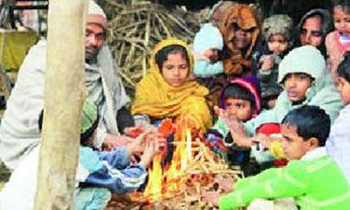
Meerut, Jan 16: Forgotten by most and out in the cold, quite literally, 25 people have died of chill this winter in the Muzaffarnagar camps that continue to house a little over 3,500 riot refugees.
Last year, though, had a different story to tell. In January 2014, Mohd Irfan would sit outside his tent in the relief camp at Loi village and count the number of politicians visiting those who were rendered homeless after communal riots had broken out in Muzaffarnagar in August 2013. In the violence that followed, more than 50,000 fled their villages and 62 were killed.
"General elections were around the corner and the riots were on everybody's mind," Irfan, 35, said. "It was a big issue for all political parties. Now no one cares about us. Madam, thand toh abhi bhi utni hi hai, bas ab neta log nahi aate." (It's as cold now as it was last year, just that no politicians come here anymore).
NGO Astitva, which has been working for the rehabilitation of the riot victims, told TOI on Thursday that the chill had begun to claim lives from the end of October last year.
Ironically, not only is the district administration clueless about the death count, they claim there are hardly any camps in Muzaffarnagar and Shamli though 10 can be counted straight away. "There are a few camps in Shamli but there are no relief camps in Muzaffarnagar," said additional district magistrate, Muzaffarnagar, Indramani Tripathi. "All the people at the relief camps in Muzaffarnagar were rehabilitated by December 2013. Moreover, not a single person has died in Muzaffarnagar in these winters."
If he knows about 3-year-old Simran who died in Loi on November 5, 2014, leaving wailing parents behind, he is not mentioning it. Originally a resident of riot-hit Faguna, Yakub, Simran's father, said, "We tried to keep her warm and fed her. She survived the 2013 winter, thanks to the help which came from the government, but this year she gave up on the struggle."
Minimum temperatures in Muzaffarnagar have gone down to as low as 2.5 degrees Celsius. Coupled with a severe shortage of fuel, food and medicines, the flimsy tents, many of them with holes in them, haven't been able to protect the refugees much. Their best hope has been to huddle together at night and pray for the next day to be warmer.
Crouched inside a tent in Shahpur, Jahid, who lost his wife Zarina in November last year, said, "Sometimes I feel it would have been better had we died in the riots. At least we would have been away from all this ruckus of compensation. We lost our dignity long back fighting for the money which the government says is due to us."
Maqsood, a riot victim in Budhana, said getting their hands on the compensation amount of Rs 5 lakh announced by the Akhilesh Yadav government has been endless and excruciating. "Many people have not got it till now. I, too, have not got any compensation. Because of that I still have to live in a tent. My wife, Pachho, died of the cold. I don't know when I will get the money."
Those who have managed to get the compensation and built small houses i villages nearby don't have electricity and water connections. Jaan Mohammed, who fled from Shamli to Budhana, said, "We have to indulge in katiyamari (getting unauthorised power through a hooked, extended wire from an electricity source). What can we do when the government doesn't help us? Are we supposed to live in the dark?"
Rehana Adeeb, director, Astitva, said, "It is sad that the government doesn't consider these places as camps. The administration has its own perspective and tries to keep a clean image in front of the media. But the reality is that these camps exist and the people there are striving for rehabilitation and survival."
Asked why the district administration has not been able to provide even basic amenities to the riot victims, Tripathi said, "Rehabilitation is a process. It takes time. A Rs 300 crore-project under Multi-Sectoral Development Programme (MSDP) will be sanctioned in the coming financial year. That will take care of the electricity and water connections for the rehabilitated people."






Comments
Add new comment